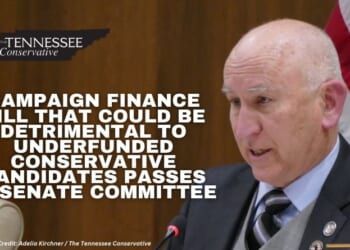
Why, indeed? We’ll get to the answer momentarily, but first let’s allow Bill Maher to properly frame the question, as well as his opinion about complaints of “politicization.”
TMZ’s Harvey Levin chats up Maher about the start of his new season of Real Time, which launches tomorrow night on HBO, as well as the story of Maher’s odyssey through the state and local bureaucracy just to build a shed on his own property. No one who has ever lived in California and Los Angeles would be surprised that it took well over a year to journey through that process, even though the purpose was to add solar power to Maher’s property.
Now, though, Gavin Newsom and Karen Bass are pledging to cut all that red tape to allow victims of the wildfires to rebuild their homes as quickly as possible. Maher wonders why it takes a disaster for bureaucrats to realize how bad their system actually is (via Hollywood in Toto):
Maher infamously battled California red tape while trying to build a shed on his property for solar panels. He shared that skirmish with the public, hoping to shame local officials into moving the matter along.
That’s a luxury most homeowners don’t have.
The experience taught him how entangled red tape can be in the Golden State, which doesn’t bode well for rebuilding the greater LA area. Both Adam Carolla and Andrew Schulz have shared similar concerns.
Now, Mayor Bass is vowing to slice away said tape, but why did it take a disaster to make such a common sense decision?
“They’re all saying, ‘We’re gonna cut red tape,’ as if they’re doing us a favor. If you can do it now, why don’t you always do it? It’s not a favor to us … why do we live in this red tape nightmare the other times of the year when we’re not on fire?” Maher asked.
Why does it take a catastrophe? Because progressive bureaucrats are motivated by their own agendas, and only incentivized to operate against them in emergencies. California has spent decades keeping property owners from normal uses of their property, even (as Maher experienced) when those uses at least somewhat align with the elites’ professed values. They also want to soak taxpayers for every cent they can get in every transaction, which incentivizes them to insert as many steps in the process as they can — an endless series of applications, permits, and inspections for any significant use of property in the state and in the city.
In a disaster, though, especially one magnified exponentially by government incompetence and malfeasance, these same bureaucrats and politicians need to minimize the consequences of those failures. They know that the normal process will create an avalanche of misery that doesn’t usually matter in isolated cases but will get tons of attention in the aggregate. That means too much scrutiny on the radicals, which means the radicals suddenly get very reasonable … at least for a while.
Maher’s a great example of this, as I am certain he understands. No one would have bothered paying attention to one homeowner battling red tape for over a year just to build a shack for solar panels on his own property. (For reference: it took me less than two weeks to get a permit for my shack in Texas in 2022, and that was mostly just a backlog of applications.) Even with Maher talking about it on national TV, the bureaucrats couldn’t have cared less. But with tens of thousands of irate victims of the fires and the mismanagement that made them exponentially worse, and the focus by national media on their plight, these same bureaucrats suddenly need to look helpful to property owners.
Don’t think for a moment that Greasy Gavin and Absent Bass just discovered red tape or are shocked, shocked to find out about it. They are desperate to avoid accountability for years and decades of mismanagement by the progressive establishment that put them into these offices … and the progressive establishment is even more anxious to avoid it. As soon as the national scrutiny ends, they will snap back to the same business as usual that created much of this misery in the first place.
Finally, let’s talk about politicization of tragedies. I agree with Maher’s argument about this being a convenient dodge for whoever’s on the defensive … to a point:
I’m with the people who want to hold politicians accountable. You know, this ‘we shouldn’t talk about it now’ — it’s so funny to hear that coming out of the mouths of liberals, because they hate it when conservatives say that after a gun tragedy. Which is what conservatives always say after a mass shooting: ‘This is not the time to politicize it.’ And then it never is. It’s absolutely the time to talk about it.
That’s a fair argument and comparison, even apart from the fact that no one waits to discuss policy in the wake of tragedy any more. That went out the window when social media emerged as a new public square, and the notion almost seems quaint in 2025. And some conservatives still make that argument on its own after mass shootings, but the objection from most is that the debate over policy after shootings usually consists of non-sequiturs and irrelevancies. Those begin without a complete set of facts and any sense of what policies might have impacted the incidents — and what laws already in place did or didn’t do for prevention or mitigation. The “debate” over firearms policies are usually just a series of demands for either gun-control hobby-horse agenda items and/or a way to distract from the failure to enforce existing laws before the shooting occurred.
Otherwise, though, Maher’s right about the no-politicization argument being a strategy for no accountability. I may not agree with everything Maher says here or anywhere else, but give him credit for saying something meaningful and coming down on the side of accountability.
For a final word, here’s Republican Assemblyman demanding accountability for decades of incompetence and bureaucratic failures.
Democrats have controlled every level of government in California for nearly two decades. Republican policy solutions like CEQA exemptions for wildfire preparedness have been blocked or vetoed by this Governor, and the People have a right to demand accountability. pic.twitter.com/HOuEsJ3Ip2
— Bill Essayli (@billessayli) January 15, 2025









